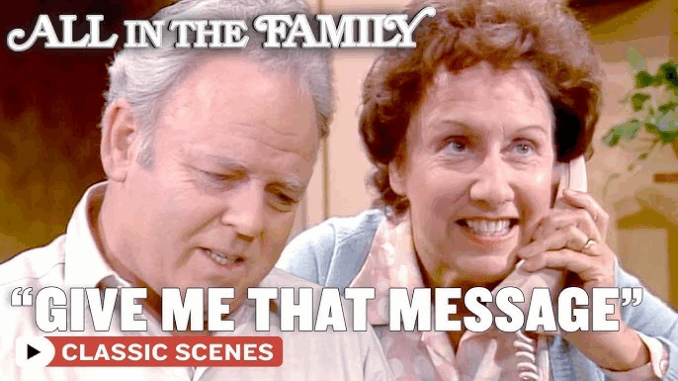
In a time when TV was dominated by cheerful, family-friendly fare, All in the Family broke every rule and revolutionized the American sitcom. Premiering in 1971, it quickly became one of the most talked-about shows in television history, daring to tackle issues that many believed were too sensitive for prime time. With its no-holds-barred approach to racism, gender roles, political divides, and class tensions, All in the Family didn’t just entertain—it forced a nation to face uncomfortable truths about itself.
At the center of this cultural game-changer was Archie Bunker, a working-class, middle-aged man with an array of outdated, often offensive views. Played by Carroll O’Connor, Archie became the embodiment of a certain segment of American society: stubborn, resistant to change, and frequently bigoted. But rather than portraying Archie as a simple villain or caricature, All in the Family gave viewers the chance to see the complexities beneath his crusty exterior. Through Archie’s character, the show sparked debates about the struggles between generations and the changing social landscape in post-Vietnam, post-civil rights America.
The true brilliance of All in the Family lay in its ability to use humor as a weapon to dissect some of the most entrenched problems of the day. The show often felt like a battlefield where clashing worldviews were thrown into sharp relief. Archie’s outrageous comments about race, women, and politics set the stage for powerful exchanges with other characters, especially his son-in-law Mike (nicknamed “Meathead”), who represented the younger, liberal generation challenging Archie’s narrow perspective. Their ongoing feud wasn’t just a sitcom trope—it was a reflection of a country in the midst of ideological warfare.
The most remarkable aspect of All in the Family was how it managed to be both deeply funny and deeply uncomfortable at the same time. The humor was bold, irreverent, and often controversial, with jokes that addressed taboo topics head-on. Yet the show didn’t shy away from the gravity of these subjects. It tackled issues like racial prejudice, women’s rights, and the generational divide with brutal honesty, forcing viewers to confront the ugly truths about the state of American society at the time.
Take, for example, the way the show portrayed Archie’s attitudes toward race. His regular use of racial slurs and offensive stereotypes was portrayed as a reflection of his ignorance, but it was never excused or glorified. Rather than reducing racism to a punchline, All in the Family exposed it as an uncomfortable but pervasive issue, one that needed to be addressed in order for the country to heal and move forward. The series didn’t just make fun of Archie’s ignorance—it critiqued the larger societal systems that allowed such attitudes to thrive.
But while Archie was the show’s central figure, All in the Family wasn’t just about highlighting his faults—it was about giving voice to those who challenged him. Characters like Gloria, Archie’s daughter, and Mike, her husband, represented the future of a more inclusive, progressive America. Their frequent clashes with Archie’s worldview weren’t just for comedic effect—they were powerful moments of resistance, where the younger generation fought for social change, gender equality, and racial justice. These characters symbolized the hope that change was possible, even if it was slow and painful.
Despite the sharp critiques of American society, All in the Family never lost its warmth or humanity. It showed that, even amidst all the tension and conflict, family bonds were strong enough to bridge the ideological divide. This was, perhaps, one of the most important lessons the show imparted: the importance of dialogue, even when that dialogue is messy and uncomfortable. The show didn’t ask viewers to agree with each other—but it did challenge them to understand each other.
The influence of All in the Family can still be felt in today’s television landscape. Its fearless approach to social issues paved the way for other shows to explore the gritty realities of life, while never sacrificing humor or character depth. From The Simpsons to South Park to Roseanne, modern sitcoms continue to use sharp social commentary to reflect the struggles and triumphs of contemporary society. All in the Family proved that comedy could be both a mirror and a microscope—reflecting society while magnifying its flaws, all the while making us laugh at the absurdity of it all.
Ultimately, All in the Family wasn’t just about family dysfunction or political conflict—it was about how we, as a society, confront the hard truths of who we are. It changed the course of television by proving that comedy could be a powerful tool for social change. By bringing uncomfortable issues to the forefront, the show dared to ask: Can we laugh at ourselves while we work toward a more inclusive, tolerant future? In doing so, it forever altered the landscape of television, and its legacy lives on in every show that isn’t afraid to make us laugh and think at the same time.
